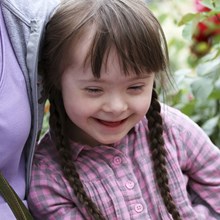Note: This article is excerpted from our training tool Eliminate Barriers to Community.
I felt a hand reach from the booth behind me and grab my shoulder. It was a small hand, so without looking, I said, "Hi there, Sweetie." I imagined a child behind me, maybe a little older than my youngest son, was exploring this new person.
When the hand reached up the second time to touch my arm, I turned to greet my visitor. I met Kayla. She was with her grandfather. Kayla was 12 years old, but very small for her age. She had Down Syndrome.
The grandfather quickly apologized for her interruption. I told him she was fine, explaining that I have a couple special needs kids of my own.
As the grandfather paid the check, Kayla became increasing interested in me. At one point she was halfway in my booth hugging me like I was a long lost uncle. It was sweet and innocent.
As the grandfather proceeded to gather up Kayla and head out, he turned to me and said, "Thank you." I knew he meant more than just a simple thank you. I could hear in his words, "Thank you for accepting us. Thank you for not getting irritated. Thank you for being kind to my granddaughter." I understood exactly what his thank you meant because I've faced that misunderstanding with my sons at times.
A Personal Understanding
I turned back to my company in my booth, Brett Eastman, who has kids with special needs as well. He said, "Only a dad of special needs kids would understand that." He was right. At an earlier point in my life, I would have freaked out and moved to a different booth very quickly. But once you're in the special needs community, it's a different story.
Out of my four children, my two oldest sons both have special needs. My first son was born with a birth defect which has led to variety of physical and behavioral issues over his 13 years. While he is very intelligent and high functioning, his world is full of specialists: gastroenterologist, psychologist, neurologist, orthopedist, audiologist, and so forth. He attends the South Carolina School for the Deaf and Blind, which has further immersed our family in the special needs world.
My next oldest son is nine and is homeschooled. He's never been in public school because he would never tolerate it. He is the most intelligent member of our family, and he's very kind, sweet, and conscientious. Yet at the flip of a switch, he can enter into an autistic rage that defies all reason. Imagine Bruce Banner becoming the Incredible Hulk: We live with a nine-year-old Lou Ferrigno.
Having children with special needs doesn't make me an expert, though. After all, there's a wide variety of special needs out there. This is exactly what makes it difficult for churches to serve families with children who have special needs. Special needs include various levels of ability, and may include physical, mental, and behavior issues. And, of course, some children have more than one special need.
The special needs world is complicated. It's a world of IEPs and specialists and accusing stares. It's a world that outsiders can't really comprehend, full of stress and financial pressure—which often lead to divorce.
Even more importantly, people in the special needs world often lack community. One therapist in Colorado commented, "These families really don't have any friends." Often their children's special needs exclude them from normal relationships. Our society, in general, is very busy and isolated. It's hard enough to make time for a friend, let alone a special one. And these parents don't want to be pitied. Instead, they'd like to be heard and seen.
Meeting a Real Need
According to a recent CNN report, 1 out of every 68 children has an Autism Spectrum Disorder. That's a lot of families sitting at home on Sunday morning or not joining a group because they don't know if they'd be welcomed. They're afraid of what might happen if their child acted out in a public setting. Most churches don't offer special accommodations, so these people on the fringe feel left out. Even if churches do try to make accommodations, it's difficult to offer accommodations for every possible special need. Most families simply think it's easier to stay home. But there are churches who are offering some helpful solutions for parents of special needs children, and their ideas might work well in your context.
1. Groups at Church
I am a big believer in small groups meeting off campus and in homes. Overall, there are numerous reasons that it's better for the groups, the church, and the community. But there are some exceptions to this, and one is children with special needs and their parents.
At LifePoint Church in Smyrna, Tennessee, Eddie Mosley, Group Life Pastor says, "Special needs kids have a specially painted and furnished classroom. Two adults guide the time, and each kid gets a trained high school student as a buddy. They participate in the class for two sessions while parents go to worship during the first session and then meet in their on-campus small group during the second session."
Andrew Mason, Small Groups Pastor at Real Life Church in Sacramento, California, offers, "We have a group for parents of kids with special needs. It's called, A Time For Me. The group meets for two hours one morning a week at a local coffee shop. Since children are in school, parents are free to come. If they have younger children, they bring their children with them. The group understands if there are any issues during the meeting. There is no set curriculum, but it's a time to offer support, care, and community resources to parents. They pay special attention to the calendar and discuss crucial times of the year like IEPs and seasons which produce a great deal of change and stress like Christmas, summer, and school breaks.
"Real Life also has a designated classroom on Sundays for our Special Grace Ministries," Andrew continues. "Kids with special needs can be checked in there for the morning or just brought in for 5-10 minutes so they can catch their breath and calm down." The walls are painted with a low key, bland color to reduce overstimulation and allow children to recover from anxiety or a meltdown. The classroom is staffed by loving and caring volunteers who understand special needs.
While most groups should meet off campus, parents of children with special needs might need a little more logistical help to make a meeting happen. Providing a room at the church and specialized childcare is a big investment for a church, but it certainly pays off for these families. Childcare workers might not be easy to find. Depending on the children's special needs, some training or expertise might be necessary, but in most cases a loving, understanding person who treats the kids like kids will go a long way.
2. Accommodating Meetings
Pastors Jim and Jennifer Cowart of Harvest Church in Warner Robins, Georgia, invited their congregation to start groups with a new approach. They weren't looking for leaders or asking people to sign up for groups. They invited their members to gather a group of friends to do a study. This gave a mother of children who have special needs an idea.
"I never felt like we could just join a small group," the mother said. "People wouldn't understand if my sons acted out. I felt it would cause a lot of disruption to any group we would join. The same would hold true if I started a group. But this new invitation fit us just right. I could do a group with people who already knew us. If my boys' behavior was off, the group would understand. They knew this went with the territory. For the first time, I felt like we finally had a way to join a group."
In my family, when our oldest was very young and our only child at the time, we would host the group at our house. We would put our son to bed, but have a baby monitor close by in case he needed us, then the group would start around 7 pm. He usually stayed asleep, but if he needed us, one of us would slip out. Granted, our son was the only child with special needs in the group. Children of the other group members were watched by a babysitter in another room. Creating a group that allows for this kind of flexibility and accommodation can mean a lot to parents of children with special needs.
3. Support Groups
When a family welcomes a child with special needs into the world, they enter a new normal. When the baby first arrives, everyone is anxious and asks about the baby a lot. Friends and fellow church members want the baby to get fixed and be normal. When that proves not to be the case, people eventually back off. It's too much for them to think about.
Everyone needs a place where they feel accepted and understood. This is especially true for these families. If, say, your child has a g-tube and needs to be fed during the meeting, it's better to be in a circle of people who understand than people who try not to look.
When you've had a terrible day because your child had an autistic meltdown in the middle of Target, this circle will understand that it wasn't a result of bad parenting or a lack of discipline. Sometimes it just happens.
Sometimes we just need a community of people who struggle in the same way, who understand, and who can encourage us with their own similar stories. That doesn't mean, however, that the curriculum for the group always has to be about special needs, or somber topics. It can simply be enough to go through any study—whether on relationships, parenting, or spiritual practices—with a circle of friends who get it.
4. Separate Groups
Another way to serve these parents is through men's and women's Bible studies. Dad goes to a men's group, and Mom goes to a women's group. One parent can take care of the kids while the other is at group. This allows families to stay with their children rather than try to find someone who is qualified to take care of them. It's also great for new parents or parents new to small groups. This experience can help them feel more comfortable with trying other types of groups.
I wish I could offer every church an easy process to duplicate to help the parents of special needs in your church, but I can't. Every family's situation is different, and the variety of special needs is huge. Start by talking to the families who are currently part of your church and see what they need. Once their needs are accommodated, then you can begin to embrace the needs in the community. Talk to educators, counselors, and therapists in your area to begin understanding how you can serve these families. It's always a good idea to pilot a few groups, too. Once the word is out, you'll likely draw more people than you've anticipated.
Note: This article is excerpted from our training tool Eliminate Barriers to Community.
—Allen White is a pastor, teacher, writer, and speaker.











